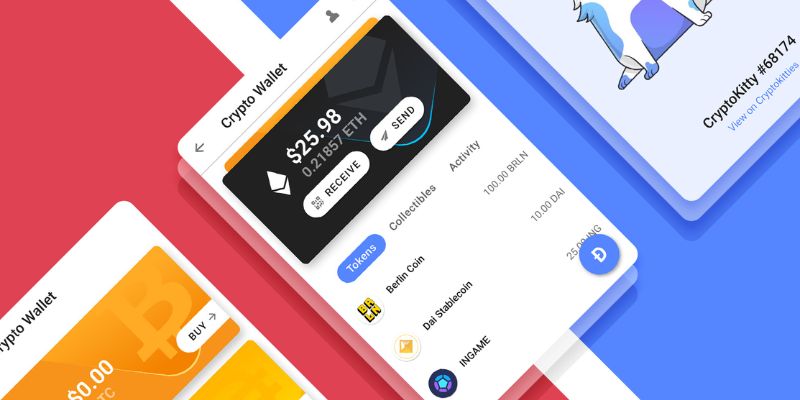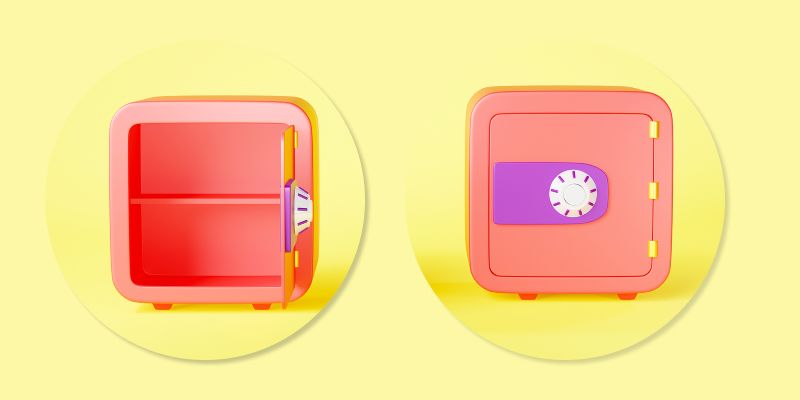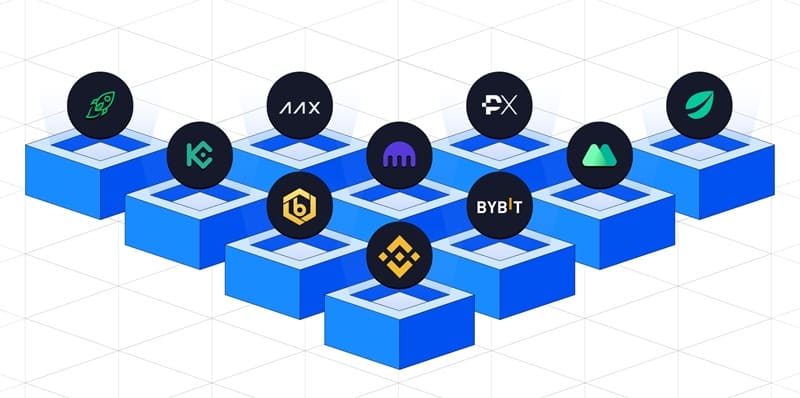How to choose a secure crypto wallet is a lot like finding the best vault for your valuable gold. You wouldn’t stash your gold in a wooden box with a simple padlock, right? Neither should you tuck your digital currency into a wallet without iron-clad security. I’ve got the secrets to lock down your crypto like Fort Knox, and I’m ready to spill them. From understanding hot versus cold wallets to selecting encryption that could stump a spy, get ready to turn your digital wallet into a veritable fortress against hackers and hazards. Buckle up; your crypto’s about to get a whole lot safer.
Understanding Different Types of Crypto Wallets
Hot Wallet vs Cold Wallet
What’s a hot wallet? It’s like your wallet right now: easy to use, always ready. But it’s online. That means it’s at risk like your phone if it’s not safe online. Hackers want in, so you must be careful.
Now, what’s a cold wallet? Think of it as a safe. Your money is offline, tucked away safe from hackers. It’s harder to get to when you need it but way safer.
Custodial vs Non-Custodial Wallets
Heard about custodial wallets? That’s like having a bank. They keep your coins safe. But remember, it’s their space, not yours. They hold your keys, and that’s a big deal.
What about non-custodial wallets? That’s all you. You’re the boss and hold your keys. That means more work, but it’s worth it. No one gets in unless you let them.
Let’s go deeper now. Hot wallets are great for daily use. You’re trading, spending, living the crypto life. Think apps on your phone or your computer. Watch out, though: keep them secure. Use strong passwords, maybe even two-factor authentication. You want to keep those sneaky thieves out.
For cold wallets, it’s like locking your treasure in a chest. They can be pieces of paper (yes, paper!) with your secret codes on them. Or fancy hardware wallets that look like USB sticks but are mini Fort Knoxes.
When selecting a crypto wallet, think about how you’ll use it. Are you in it for the long haul with a lot of coin? Cold storage wallets are your best friend. Planning to buy and sell a lot? Then you might lean towards a hot wallet.
Custodial wallets might feel more familiar, kind of like using PayPal. It’s simple: log in and go. But the price is trust. You trust them to hold your digital dollars. They do the heavy lifting, but if they mess up, your coins could be gone.
Now, non-custodial wallets put you in the pilot’s seat. You have all the control. That also means you must guard your wallet seed phrases like they’re gold. Lose them, and you’re out of luck.
So, sum it up: hot wallets are super handy but need tight security. Cold wallets take more effort but protect your coins like a champ.
Custodial is easy but risky if the host messes up. Non-custodial manes more work but gives you full control.
And one last tip: no matter what wallet you go for, back it up. Always. Then you can rest easy knowing your cryptocurrency is as safe as it can be.
Specifics of Crypto Wallet Security Features
Wallet Encryption Methods and Biometric Security
When you pick a wallet, think of it like you’re choosing a safe for your gold. It’s where you’re going to lock up your digital treasure—your cryptocurrency. You want this digital Fort Knox to have the best locks you can find. That’s where wallet encryption methods come in. They keep your stash safe by turning plain info into code. It’s like writing a secret message only you can read. So, when someone tries to get to your crypto, they find a puzzle they can’t solve. Now, let’s kick it up a notch with biometric security. We’re talking fingerprint scans, maybe even retina checks! This means even if someone cracks your code, they still can’t get in because they’re not you.
Multi-Signature Wallets and Two-Factor Authentication
Now imagine you need two keys to open that safe. That’s what multi-signature wallets do. They need more than one okay before they let anyone do anything with your crypto. It’s a buddy system for your wallet! And there’s two-factor authentication, a fancy way of saying there’s a second step to prove it’s really you. Like when a door asks for a password and then sends a code to your phone. So, it’s not enough to know the password; the door wants to make sure the person with the password is you by checking your phone too.
Both of these, the two heads nodding together and the double-check with your phone, are like guardians for your wallet. They make sure only the right person gets in. And that should be you and only you. So when you’re selecting a crypto wallet, think teammates and double doors. Always go for the option that needs more than one yes to open up and asks for proof that yes is coming from you!
Make sure you keep up with the best practices for storing crypto too. Smart choices today are locks on your future.
Best Practices for Storing and Backing Up Your Crypto
Understanding Wallet Seed Phrases and Private Key Security
Your crypto wallet is like your online banking app but for your digital coins. Think of it as the key to your safe where your digital gold is kept. Wallet seed phrases and private keys are crucial for keeping your crypto secure. A wallet seed phrase, often called a recovery phrase, is a list of words your wallet creates. This phrase is the master key to access your coins. Without it, if you lose your device or it gets damaged, your crypto could be gone for good. Now, your private key is a secret code that lets you move your coins. This should be known by you alone. If someone else gets it, they can spend your digital money.
So, keep your seed phrase and private key safe and secret. Write down your seed phrase on paper and store it somewhere safe at home. Make sure it’s not close to where you keep your wallet. As for your private keys, use a wallet that encrypts this info for an extra layer of defense.
Secure Wallet Backup Solutions and Recovery Processes
Backing up your crypto wallet is super important. Think about what would happen if your computer crashes, or a virus hits your phone. Your digital cash could be at risk unless you have a safe backup plan. That’s where secure backup solutions come in. The goal is to have a plan B to get back your digital coins if something bad happens to your main wallet.
A simple practice is to copy your wallet data onto several USB drives or use a hard drive. Keep them in different places–some at home, maybe one in a bank safety deposit box. Another cool option is a hardware wallet. These are like secure USB sticks designed just for crypto. They’re less likely to be hacked since they’re not connected to the internet. Remember, always choose wallets that give you the option to back up and know their recovery process!
For recovery, your seed phrase is your lifeline. If your wallet crashes or gets lost, you can use it to recover access to your coins. Be sure you know how to use your wallet’s recovery process. Maybe practice it if it’s tricky. And only use this process on the wallet’s official app or website. This avoids falling into the trap of phishing attacks.
By following these guidelines, your digital assets can be as secure as possible. Your crypto deserves a strong line of defense against thieves and tech issues. Sure, it’s a bit of work. But it’s worth it to keep your digital treasure safe.
Evaluating and Selecting a Secure Crypto Wallet
Hardware Wallet Advantages and Reputable Wallet Providers
When picking a wallet to keep your crypto safe, think of it like your own digital Fort Knox. A secure option is the hardware wallet. This is a small device that stores your crypto offline. That way, hackers can’t get to it.
Hardware wallets are part of the “cold storage” family. This means they are not hooked up to the net all the time. So they are less at risk than “hot wallets,” which are always online. Think of a hardware wallet like a safe that’s hard to crack. You connect it to your computer or phone when you need to, and not a second more.
Now, not all hardware wallets are the same. You want to look for ones that are well known and have good word of mouth. Trustworthy brands are important. They make sure your crypto stays safe. For new users, brands like Ledger or Trezor are often the go-to choices. They’ve been around and have a good track record.
Software Wallet Reviews and Mobile Wallet Safety Tips
On the other side, we’ve got software wallets. These are apps or programs where you can store your crypto. They’re handy, sure. But they’re also more exposed since they live on devices that are online a lot.
So how can you spot a good software wallet? Look at the reviews! See what other folks are saying. Are there any big red flags? Make sure it’s an app that gets regular updates and fixes. That helps keep the bad guys out.
Mobile wallets are like software wallets that go where you do. You carry them on your phone. They can be super useful, but you’ve got to play it safe. Here are some quick tips for mobile wallet safety:
- Only download wallets from trusted sources, like official app stores.
- Keep your phone’s software up to date. This helps patch up security holes.
- Use all the security features the wallet offers like pins, biometrics, and two-factor authentication.
- Don’t click on weird links or messages that could be phishing attempts. Phishing is a trick to steal your info.
And, always remember this golden rule: Your private key is the key to your crypto kingdom. Never share it. It should stay secret, like a diary under lock and key. Using wallets with strong security features is a must. Look for encryption and backup options to protect your crypto if something goes wrong.
Choosing the right crypto wallet means thinking about safety first. Whether it’s a hardware wallet to keep things offline or a software wallet with robust security, the aim is to shield your digital riches from the prying eyes of the online world. It’s your money, after all—make sure it’s locked down tight!
In this post, we dove into the crypto wallet world. You learned the difference between hot and cold wallets, and custodial versus non-custodial options. We also explored security features like encryption and biometric locks, plus advanced stuff like multi-signature access and two-factor authentication.
Keeping your crypto safe is key, so we covered how to handle wallet seeds and private keys, and how to back up your stash right. Finally, we touched on picking a secure wallet, looking at hardware perks and reading up on software wallet reviews.
My final thoughts? Staying informed is your best defense in the crypto game. Choose your wallet wisely, protect your keys, and always back up. Stay safe out there!
Q&A :
What factors should I consider when selecting a safe cryptocurrency wallet?
When choosing a secure crypto wallet, it’s essential to consider the wallet’s security features, such as two-factor authentication, multi-signature support, and whether it’s a hardware or software wallet. Moreover, whether the wallet depends on a custodial or non-custodial service can drastically influence its safety. Users should also evaluate the reputation of the wallet provider and the extent of customer support available.
How can I determine the security level of a crypto wallet?
To determine the security level of a crypto wallet, investigate whether it possesses robust encryption for protecting private keys. Look for reports of past security breaches and how they were addressed. Assess community feedback and professional reviews. Additionally, confirm if the wallet undergoes regular security audits by reputable third-party companies to identify potential vulnerabilities.
What are the differences between hardware and software crypto wallets in terms of security?
The primary difference between hardware and software wallets is their exposure to online environments—hardware wallets are physical devices that store private keys offline, making them less vulnerable to online hacking attempts. On the other hand, software wallets can be stored on devices that are connected to the internet and hence, are more susceptible to cyber threats and malware.
Is it safer to use a multi-currency wallet or separate wallets for each type of cryptocurrency?
Using a multi-currency wallet provides the convenience of managing multiple cryptocurrencies in a single place. However, it may also mean that if the wallet is compromised, all the assets could potentially be at risk. Separate wallets for each cryptocurrency can offer a higher level of compartmentalization, reducing the risk of a single point of failure but it can be more complicated to manage.
What role do updates and backups play in maintaining crypto wallet security?
Keeping your crypto wallet updated is paramount; updates often contain patches for security vulnerabilities that have been discovered since the last version. Regular backups ensure that if your device is lost, stolen, or corrupted, you can restore your wallet using a backup file or seed phrase—keeping these backups secure and offline is crucial to avoid unauthorized access.





